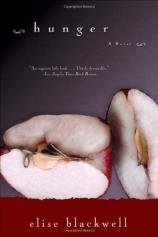Reading Group Guide
Discussion Questions
Hunger: A Novel

1. Not long after the siege begins, the scientists at the institute form a pact and agree to preserve the seeds at all costs. What is the narrator's immediate response to this decision? How does this scene fore-shadow subsequent events?
2. Describe the narrator's relationship with his wife, Alena. What draws them to each other? How does the narrator see himself in comparison to his wife? Do his infidelities belie his claim to love her deeply, or do you believe his devotion to her remains separate from his sexual escapades?
3. In the novel, images of the devastation of the hunger winter are offset by equally vivid images of the narra-tor traveling to exotic locales, collecting specimens, and eating local foods. What insights into appetite and deprivation does the narrator gain from con-trasting these experiences?
4. Alena is arrested for her role in the campaign to release the great director. What is the reaction of her husband and her colleagues to her decision to sign the letter? Given the risks, do you think her act was foolish or futile, or did she achieve something through this act of resistance?
5. Throughout the book, the narrator meditates on the nature of courage and cowardice and on the choice of those who survived the siege and those who did not. He says, "The bravery to survive is a ruthless one. Martyrdom leads, by its very definition, only to the cold ground" (page 34). Which do you believe is the braver choice? What do you think you would do in such a situation?
6. Several of the book's female characters --- Alena, Lidia, Efrosinia, Klavdiya --- are strong personalities in their own right. How does the narrator view each of them --- with admiration, with contempt? Why? Although these women are quite different from one another, do they have anything in common?
7. Babylon is a recurring theme throughout the novel. What do the images of this ancient civilization represent to the narrator? What is the significance of the epigraph by Paul Valéry at the beginning of the book?
8. At the end of the book, the narrator catalogs the contents of his pantry, including an unusual keepsake. What is the significance of this eclectic collection? Is his attitude at the end of the book one of regret, acceptance, bitterness, or something else?
9. Does the narrator change as a result of his experiences during the siege, or does he emerge much the same as before the war? Do you think suffering is always a wholly negative experience, or do you believe it can ennoble us? Does the reader come to an understanding that is deeper than, or at least different from, the narrator's understanding?
10. Discuss the author's choice of narrator. How might the story be different if it were told from the point of view of another character? Which other point of view would you most like to know about?
Hunger: A Novel
- Publication Date: May 3, 2004
- Paperback: 160 pages
- Publisher: Back Bay Books
- ISBN-10: 0316907197
- ISBN-13: 9780316907194







